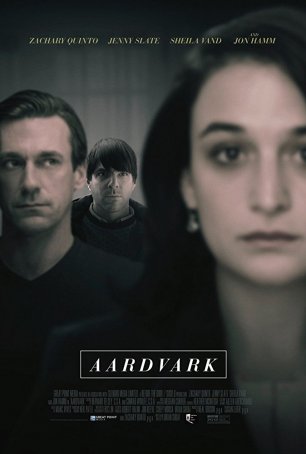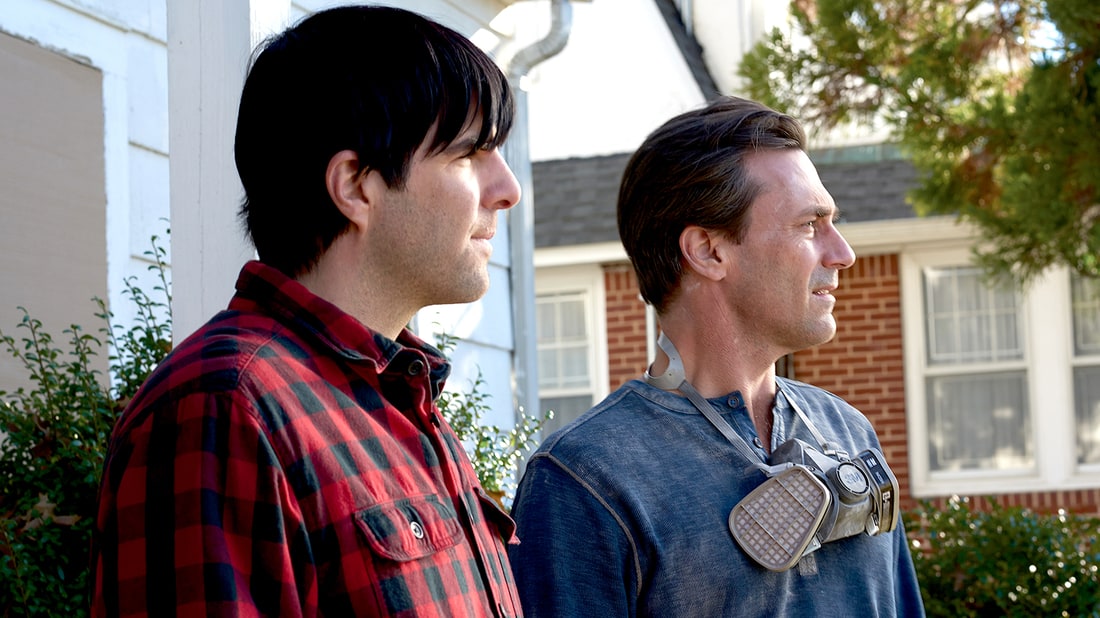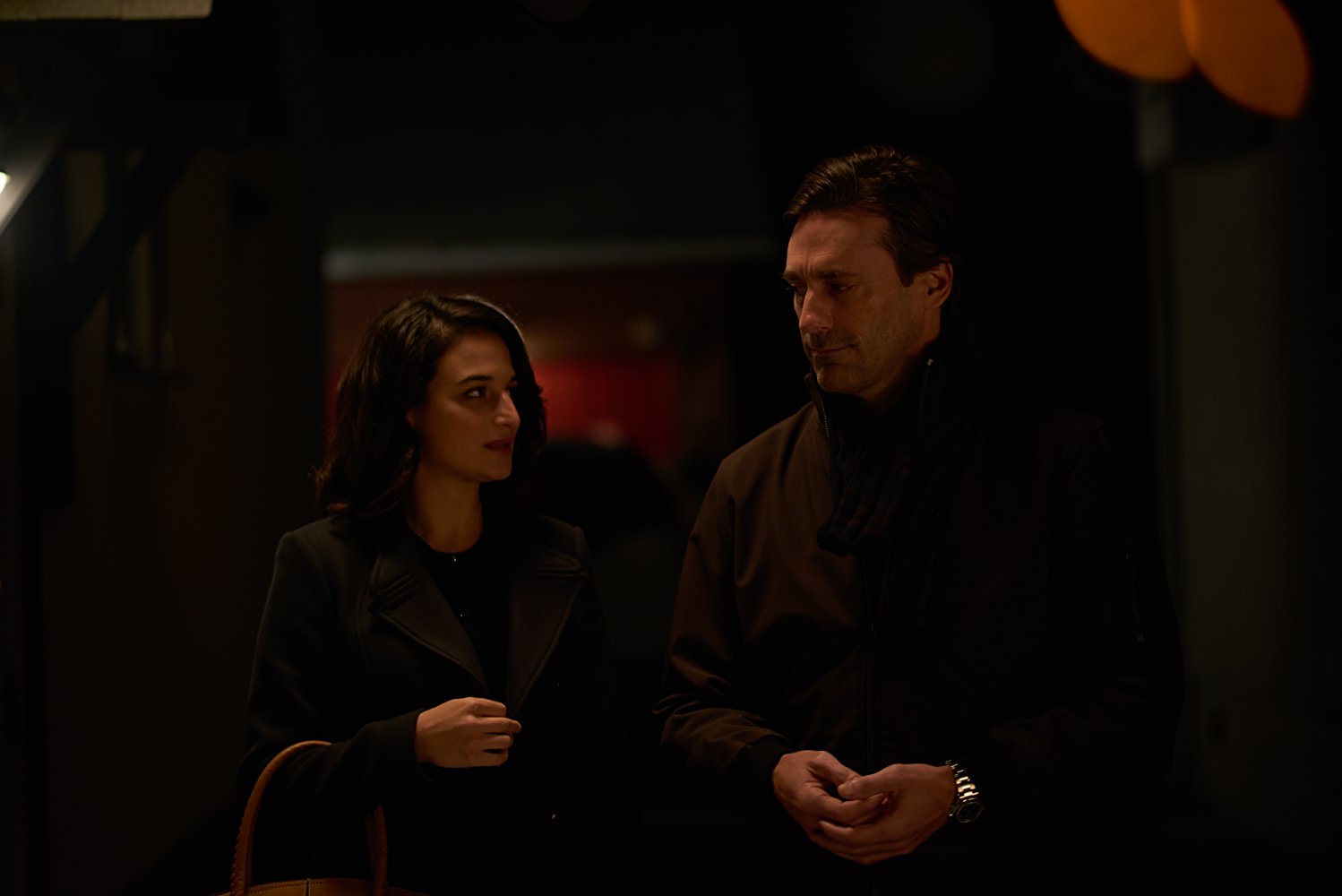Aardvark (United States, 2017)
April 13, 2018
With a title seemingly designed to get the movie placement at the top of alphabetized lists, Aardvark is a hard-to-swallow drama about sibling rivalry, mental illness, and bad therapy. Cobbled together using clichés and contrivances, Brian Shoaf’s feature debut perceives mental illness more as a personality quirk than a sickness and treats it almost as a kind of magical realism. With its Beautiful Mind-lite flavor, it presents the hallucinations of the main character as “real” and offers a pat conclusion that feels artificial and insulting.
 A miscast Zachary Quinto plays Josh, the protagonist who is
struggling with some form of depression or psychosis. He’s off his meds
(because he doesn’t like how they make him feel) but has consented to enter
therapy. Unfortunately, the woman he chooses to see, Emily Milburton (Jenny
Slate), is incompetent. It’s unclear what her training is (she confides that
she doesn’t have either a PhD or an MD) but she has boundary issues, doesn’t
understand how to lead a session, and lacks a basic understanding of ethics.
Josh’s primary issue relates to his famous TV star brother, Craig (Jon Hamm),
who has come home for a few days to conduct some business. Josh and his brother
are no longer in touch and the root of their estrangement lies in a long-ago
trip they took to the zoo. (The title refers to an animal that plays a
recurring part in Josh’s memories of that day.)
A miscast Zachary Quinto plays Josh, the protagonist who is
struggling with some form of depression or psychosis. He’s off his meds
(because he doesn’t like how they make him feel) but has consented to enter
therapy. Unfortunately, the woman he chooses to see, Emily Milburton (Jenny
Slate), is incompetent. It’s unclear what her training is (she confides that
she doesn’t have either a PhD or an MD) but she has boundary issues, doesn’t
understand how to lead a session, and lacks a basic understanding of ethics.
Josh’s primary issue relates to his famous TV star brother, Craig (Jon Hamm),
who has come home for a few days to conduct some business. Josh and his brother
are no longer in touch and the root of their estrangement lies in a long-ago
trip they took to the zoo. (The title refers to an animal that plays a
recurring part in Josh’s memories of that day.)
Jenny and Craig meet and, with minimal preamble, are sleeping with each other. Josh senses that something is going on but, when he raises the question, Jenny denies having met Craig. Meanwhile, Josh hallucinates encounters with Craig is various disguises: an old, homeless woman and a bicycle-stealing cop. He also “meets” a young woman named Hannah (Sheila Vand), who is as likely to be a figment of Josh’s imagination as a flesh-and-blood human being.
 Tonally, Aardvark
is bland. The characters seem more like cardboard cut-outs than real people.
Although Jenny Slate and Jon Hamm are charismatic screen presences, they share
no chemistry. One example of how little engagement Aardvark provides can be seen during the first encounter between
Emily and Craig. She’s outside her apartment in an alley looking at her phone
when he emerges from the shadows and startles her. She drops the phone, which
he picks up as he beings talking to her. During the course of their
conversation, my attention wasn’t on what they were saying but on whether the
phone had cracked as a result of being dropped. This is emblematic of Aardvark’s central problem – an
inability to compel the attention with intriguing characters or interesting
situations.
Tonally, Aardvark
is bland. The characters seem more like cardboard cut-outs than real people.
Although Jenny Slate and Jon Hamm are charismatic screen presences, they share
no chemistry. One example of how little engagement Aardvark provides can be seen during the first encounter between
Emily and Craig. She’s outside her apartment in an alley looking at her phone
when he emerges from the shadows and startles her. She drops the phone, which
he picks up as he beings talking to her. During the course of their
conversation, my attention wasn’t on what they were saying but on whether the
phone had cracked as a result of being dropped. This is emblematic of Aardvark’s central problem – an
inability to compel the attention with intriguing characters or interesting
situations.
The characters talk a lot but don’t say much. The dialogue is what I sometimes refer to as “movie speak.” In other words, conversations evolve not as they would in real life but as they would in the mind of an author with a particular agenda. Consequently, such interactions can become frustrating to the viewer because the expectation of issues that would emerge naturally in a conversation aren’t mentioned. Far too much of the dialogue in Aardvark fits into that category. It goes beyond artistic license into the realm of the absurd.
The movie is frustrating in many ways – because it’s slow and unengaging, because of the cavalier way in which it treats mental illness, its causes and treatment, and because it fails to craft characters worth caring about. Quinto, Slade, and Hamm have all done fantastic work in the past; this joint effort doesn’t represent their finest hour.
Aardvark (United States, 2017)
Cast: Zachary Quinto, Jenny Slate, Jon Hamm, Sheila Vand
Home Release Date: 2018-08-07
Screenplay: Brian Shoaf
Cinematography: Eric Lin
Music: Heather McIntosh
U.S. Distributor: Akimiski
U.S. Release Date: 2018-04-13
MPAA Rating: "PG-13" (Profanity, Sexual Situations, Violence)
Genre: Drama
Subtitles: none
Theatrical Aspect Ratio: 2.35:1

Comments